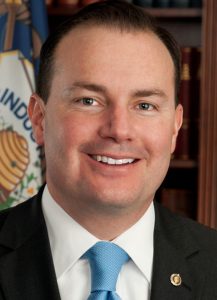By Adriane Heins
In a Sept. 15 Free to be Faithful webinar, Senator Mike Lee (R-Utah) told LCMS members that if churches were to lose their tax-exempt status — especially over religious-liberty infringements — it could “be a devastating blow from which they would not recover.”

“It would make it difficult, if not impossible, for our churches to do good things” in their communities, Lee explained. “The religious-liberty rights of all Americans are important and … we have to maintain those rights.”
Lee is co-author of the First Amendment Defense Act (S. 1598, H.R. 2802) — legislation that would, as the bill notes, “ensure that the federal government shall not take any discriminatory action against a person, wholly or partially on the basis that such person believes, speaks, or acts in accordance with a sincerely held religious belief or moral conviction that marriage is or should be recognized as the union of one man and one woman, or that sexual relations are properly reserved to such a marriage, and for other purposes.”
In short, the bill, co-authored with Rep. Raul Labrador (R-Idaho), would prohibit the federal government from denying tax-exempt status, grants, licensing and the like to any person or organization — such as the Concordia University System or an LCMS adoption agency — based on their belief that marriage remains a union between one man and one woman.
“The exemption that churches enjoy — exemption from taxes — is as old as the ages,” Lee explained. “This dates back not only years, not only decades, but centuries as the result of a long-standing understanding that it’s none of the government’s business to interfere with the operations of a church.”
“The government was made by the people for their benefit,” he said. “The people were never meant to become slaves of sorts to a government who wants to interfere with their religious freedom.”
Freedom from retaliation
One of the key components of the bill involves allowing churches, faith-based charitable organizations and schools to continue to care for those around them without threat of government retaliation.
Leslie Ford, Lee’s legislative aide for Religious Liberty, joined him on the webinar call and noted, “Faith-oriented citizens go about their work. They feed the homeless, they clothe the naked … but they don’t draw a spotlight to themselves, nor should they.”
“But part of this battle is that many Americans don’t see the importance that faith-based organizations and people play in our communities,” Ford said, noting, for instance, that the “parochial schools in the LCMS communities play an irreplaceable role” in their scope and work.
“When you think about the fact that churches play such an important role not only in the faith of the American people but in the ability of the American people to care for the poor and otherwise to care for their needs, it would make little sense … if they were subject to taxation,” Lee explained. “The power to tax is the power to destroy. And if we subject churches to taxes, that could cause a lot of problems. … We want to make sure that this is something that never happens in this country.”
Losing the right to religious freedom “would be catastrophic to so many churches and charitable organizations,” Lee acknowledged. “We can’t allow them to be subjected to unfair retaliatory treatment as a result of their beliefs.”
Lee, who hopes to see movement on the bill yet this fall, had a final word of encouragement for LCMS members: “It’s important for us to get the word out that the American people are free, that the sons and daughters of the United States of America were meant to live in freedom, that in our worship of the Lord, Jesus Christ, we demand to be free from retaliation from our government.”
Lee said, “I’d like to call all within the sound of my voice to stand behind these efforts to support religious freedom in America”
The webinar is archived here.
Learn more about Free to Be Faithful — the Synod’s education and awareness effort regarding marriage, life and religious liberty — and the Lutheran Center for Religious Liberty.
Adriane Heins (adriane.heins@lcms.org) is managing editor of The Lutheran Witness and editor of Catechetical Information for LCMS Communications
Posted Sept. 17, 2015




This article has, without finger pointing, described the problem paramount to our country. The government is no longer of, for and by the people. It is instead, a hungry monster, devoid of any purpose other than sustaining its insatiable appetite for money and power.
considering we live in a government based on a democracy and majority rule, minority opinions may be pushed aside. Perhaps the church should have been thinking about that earlier. When the point of view of the church is rendered irrelevant in society, it is a failure of the church. Not of the government.
When did the majority of one overrule the majority of the many?
If the threat of the loss of tax exemptions is of an overwhelming concern to the LCMS and other conservative and faithful Christian churches, it will impact on the Gospel preaching of the future. Fear of government retaliation for speaking the truth in a politically correct environment effectively squashes truth. It is a problem the church of Christ has faced many times. A government presiding over a hedonistic, God rejecting culture does not lend itself to sympathies for people of faith, because their values are on a collision course, and it is certain laws will be implemented against Biblical Christians, now condemned by some as bigots or radicals for opposing same sex marriage, abortion, and immorality. We must remember many have fallen away, and our land is not the same, and it may never see a revival. However, we should still stay with our convictions, even if our church’s lose exemptions, tax benefits, property, and members. Nowhere in God’s word does it say we are guaranteed an easy walk when we follow Jesus.